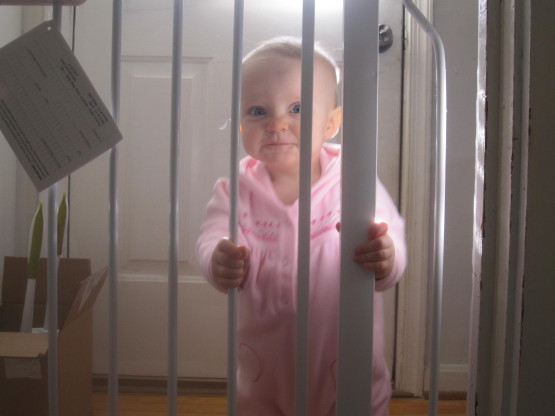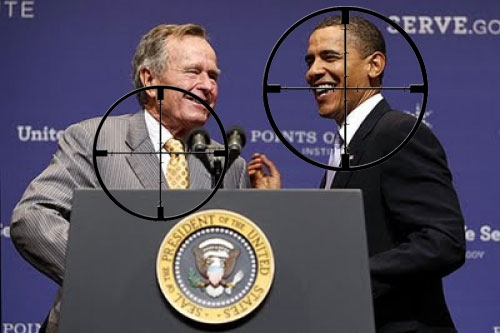Blog Archives
The success of some charter schools is often attributed to their ability to kick out underperformers and problem kids. A new Mathmatica study makes the case that it isn’t true for KIPP programs. Personally, I question whether KIPP is scalable, but not on the basis of student selection.
True love waits! Or more precisely, early sex is a pathway to non-marital cohabitation, while waiting to have sex is a pathway to marriage (and better marriages, at that). Beware confounding factors, of course.
According to a study in the Oxford University Press, children of two-parent households do better even when there is a generous welfare state. (PDF) Another study by the NIH looking at Sweden shows that the effects on criminality among teenage mothers is attenuated when looking at other factors, though educational attainment (of the children) is not.
The case for universal basic income, with empirical evidence!
Shouldn’t The Economist know better than to pretend that job scarcity and falling wages in Japan are not paradoxical?
Telegram not dead STOP Alive, evolving in Japan STOP
Chris Bowyer makes the case against college in five parts (and counting).
On the other hand, it pays to go to college if you want to be a prostitute.
Maybe political polarization isn’t so bad, if the alternative is Rhode Island.
How do you stop a gas well blowout? With a nuclear bomb, of course. (link via Vikram Bath)
Coal ash is responsible for more radiation than nuclear energy.
Tim Wu is alarmed at the number of attempts (of varying degrees of credibility) against Barack Obama, which is six and counting. I actually think that six is a really small number, all things considered. All in all, it’s actually quite amazing to me that there haven’t been many more. Truthfully, it’s kind of a surprise that none have succeeded in over fifty years, and none have reached the point of a gunshot in over thirty.
I mean, rationally, it rarely makes sense to kill a president. They picked their vice president, after all. Removing somebody that you see evil while they are running may make sense, though at that point you have to worry about martyrdom and backlash.
Leaving aside the sheer number of enemies a president makes, and the average number of completely crazy people in a nation of over 300,000,000, if nothing else you’d think by the law of numbers some wacko would be jumping the fence every few days. It seemed something like that, for a brief interval during the Clinton years, though Wikipedia only shows two in proximity.
Or, given that there are tens of thousands of suicides each year, it’s a little surprising that none of them try to go out in a blaze of glory for an instant entry into the history books.
Perhaps it’s that the likelihood of success is considered so small.
If you were to ask me what bothers me most about the guy who jumped the fence, it’s that. At least the illusion of a real possibility of success. And some crazy guy out there.
Husain Abdullah is a safety for the Kansas City Chiefs who recently scored a touchdown. It was what happened after that garnered a lot of publicity:
Early in the fourth quarter, Abdullah dropped deep in a zone coverage, read Patriots quarterback Tom Brady’s eyes and broke hard, intercepting his pass.
Abdullah then dashed 39 yards to the end zone, slid on his knees and bowed in prayer.
His celebration drew a 15-yard unsportsmanlike conduct penalty, but the NFL said Tuesday that Abdullah should not have been penalized.
This provided the opportunity for various heralds of multiculturalism and religious freedom to blow their horns. Such as:
This is manifestly unfair. Abdullah, like Tebow, is known for his devotion to his faith. Abdullah missed the entire 2012 NFL season so that he could undertake a pilgrimage to Mecca, and he fasts during Ramadan, which means he cannot eat food or drink water during daylight hours for a month, despite his grueling NFL training schedule. And yet Tebow’s prayer during games earned him respect, but Abdullah’s earned him punishment.
The NFL has admitted that the referee was wrong to penalize Abdullah. NFL spokesman Michael Signora wrote in an email to USA Today that, although there is a rule against players engaging in celebration while on the ground, “the officiating mechanic in this situation is not to flag a player who goes to the ground as part of religious expression, and as a result, there should have been no penalty on the play.”
And yet there was. Abdullah’s team was given a penalty.
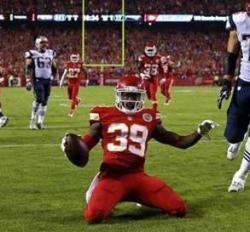 It didn’t matter towards the game. The NFL realized that their ref screwed up. There really isn’t much of a story here, except – at worst – a ref not recognizing a Muslim prayer (or the difference between a Muslim prayer and a banned celebration). From a player that rarely scores touchdowns. This was not anti-Islamic bigotry. at worst, it was split-second ignorance. Which the NFL recognized. We can say “But what if the game had been on the line?” Well, then a blown ref call would have cost a team a game. It wouldn’t be the first time. But it didn’t, and it wasn’t, and all that can really be said is that we all learned something.
It didn’t matter towards the game. The NFL realized that their ref screwed up. There really isn’t much of a story here, except – at worst – a ref not recognizing a Muslim prayer (or the difference between a Muslim prayer and a banned celebration). From a player that rarely scores touchdowns. This was not anti-Islamic bigotry. at worst, it was split-second ignorance. Which the NFL recognized. We can say “But what if the game had been on the line?” Well, then a blown ref call would have cost a team a game. It wouldn’t be the first time. But it didn’t, and it wasn’t, and all that can really be said is that we all learned something.
This all overlooks the possibility of the flag being for the slide rather than a prayer. A slide, not being a prayer, would be an infraction. But the NFL said they screwed up, and we should pretty much take them at their word.
 The conversation actually gets derailed a bit by Tim Tebow. The thing is that even though Tebow is known for his devotion and prayer, he does not generally do so in the manner that Abdullah was penalized, comments that Tebow does this “all the time” notwithstanding. In fact, I can’t find a single incident of him doing so. He prays before games and after games. The most cited case shows him after the 2012 AFC Wild-Card game between the Broncos and the Steelers. If you see a picture of him praying in an endzone, that’s probably it. Except that was after the game [video here]. And if you think you found another picture of him doing so, the fact that his helmet is off is a pretty good indicator that he didn’t just score a touchdown.
The conversation actually gets derailed a bit by Tim Tebow. The thing is that even though Tebow is known for his devotion and prayer, he does not generally do so in the manner that Abdullah was penalized, comments that Tebow does this “all the time” notwithstanding. In fact, I can’t find a single incident of him doing so. He prays before games and after games. The most cited case shows him after the 2012 AFC Wild-Card game between the Broncos and the Steelers. If you see a picture of him praying in an endzone, that’s probably it. Except that was after the game [video here]. And if you think you found another picture of him doing so, the fact that his helmet is off is a pretty good indicator that he didn’t just score a touchdown.
However, the Tebow distraction aside, there are numerous documented cases of penalty-free prayer. I find other attempts to draw a distinction (one knee down versus two) unconvincing. So the point stands. If it wasn’t for the slide, it was a bad call. Like the NFL says.
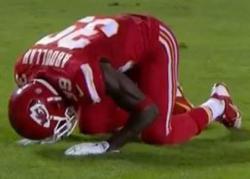 There are some broader issues at work here. Like whether there should be any religious exemption at all. Some argue that the penalties against excessive celebration are themselves excessive. Some argue that it’s racist or racialist, and if you single out white players doing it you’re just doing so to cover the racism. Personally, I think they do go too far. I don’t mind saying “no spiking the ball” or “no throwing the ball” or “no taunting” (celebrations directed, explicitly or implicitly, at the opposition). But kneeling in any context? While I think people that make it to the endzone should act like they aren’t surprised to be there, some exuberance is pretty understandable. The rules are also pretty vague, which is also something that should be corrected.
There are some broader issues at work here. Like whether there should be any religious exemption at all. Some argue that the penalties against excessive celebration are themselves excessive. Some argue that it’s racist or racialist, and if you single out white players doing it you’re just doing so to cover the racism. Personally, I think they do go too far. I don’t mind saying “no spiking the ball” or “no throwing the ball” or “no taunting” (celebrations directed, explicitly or implicitly, at the opposition). But kneeling in any context? While I think people that make it to the endzone should act like they aren’t surprised to be there, some exuberance is pretty understandable. The rules are also pretty vague, which is also something that should be corrected.
The original narrative, though, that the NFL thinks that Muslims should be penalized for doing what Tim Tebow is celebrated for, just doesn’t fit. In the end, it was a bad call by someone who thought one thing was happening when another thing was happening.
 BBC History has an interesting piece on the viking colonization of Great Britain.
BBC History has an interesting piece on the viking colonization of Great Britain.
Reason’s Todd Krainin has a piece on a beautiful, illegal tiny house. There’s a ten minute video. I do wonder how much could be done for density rather than building up, we just let people build small.
As it becomes harder to find lethal injection drugs, a prison in Lake Charles (La) went and tricked a hospital.
I actually kind of like the idea of standing on flights. I’m just worried that I wouldn’t fit in the seats.
The New York Times reports that family leave policies can become too generous. We’re not particularly close to that point, of course, but it does point to a tension between trying to generate equality for women in the workplace and allowing them the scheduling flexibility they would often prefer.
With the release of Microsoft Office 365, Joanna Stern wonders if we really need Microsoft Office anymore. Microsoft is acting less cocky about it than they used to.
Breastfeeding in public is one thing, and to be defended, but changing a baby’s diaper at a restaurant table is another.
Avik Roy is taking on the herculean task of trying to convince conservatives to reform and build on PPACA, rather than insist on repealing it.
Drill, baby, drill, has become a bipartisan mantra.
While I’m not surprised that millenials are moving to the suburbs, I am a bit surprised at the apparent urban baby boom.
We’re tempted to scoff when we hear that there are people who still subscribe to AOL, but it turns out they have their reasons, and they’re not bad reasons.
Adam Chilton and Eric Posner set out to do a study on political bias in legal scholarship. They had an initial setback of there simply not being enough conservative lawprofs. They persevered and found some unsurprising results. Josh Blackman argues that this is bad for legal scholarship.
I’ve been on Rhapsody for quite some time and still have my MP3 collection. So for Bob Lefsetz first “Rule of Spotify” to come true, the services are going to have to become a lot better.
Wikipedia: Win Hu Uprising
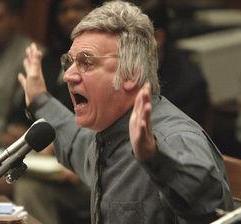 Former Congressman James Traficant (D-OH) has apparently died. Traficant was, during his tenure, one of the most colorful members of the House known for his audacious toupee, odd dress, and ending his speeches with “Beam me up…”
Former Congressman James Traficant (D-OH) has apparently died. Traficant was, during his tenure, one of the most colorful members of the House known for his audacious toupee, odd dress, and ending his speeches with “Beam me up…”
Throughout most of his tenure, he was a thorn in the side of his party. Particularly as he became more conservative and his district became more liberal. A staunch critic of immigration and Israel, he is a hero in some anti-immigration and anti-Semitic circles.
When he faced congressional expulsion, the only “nay” vote was Gary Condit. Another prominent supporter was David Duke.
Here is a snippit from one of the more colorful speeches he gave before congress:
Here is a speech he gave during his expulsion trial:
He is the only person ever to win a RICO case without counsel, though a couple decades later it was another RICO case that took him down. After seven years in congress, he served seven in prison.
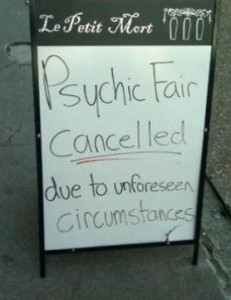 Michael Peck writes about the Soviet plan to demoralize the French. I suppose it could be a sign that I am somewhat removed from the Cold War (having come of age as it was winding down) that I find uncompelling the notion that this would have had much effect.
Michael Peck writes about the Soviet plan to demoralize the French. I suppose it could be a sign that I am somewhat removed from the Cold War (having come of age as it was winding down) that I find uncompelling the notion that this would have had much effect.
As we know, everything bad for you is good for you, including but not limited to video games.
Trams are a waste of money.
Alexandru Visineşcu is being tried for Crimes Against Humanity for his role in a Communist prison camp in Romania.
Meteors blazed across the Tennessee sky, and NASA got it on camera!
Theologians and scientists gather to talk about aliens.
Soleil Ho argues that foodie trends hurt low-income families.
After learning 20 things in North Korea, the Tim Urban fails to figure out Japan.
When nostalgia and Big Data collide, the Chinese end up reproducing the relics we’re looking for on eBay.
Enjoy it while you can, though, because China might not be a copycat forever. As I’ve said in the past, China simply doesn’t want to make our cheap junk forever, and this will change the dynamics of “outsourcing everything to China.”
io9 delivers up the story of some interesting micronations.
David Brent is coming back!
Climate change is allowing us to build an internet connection through the arctic.
I don’t know that there has ever been a time in my life when I haven’t had access to $400. It’s all quite depressing.
Housing costs are costing Britain its young people. Fortunately, the young Brits have places to go.
The atrocity that is the Designated Hitter rule was a permanent solution to a temporary problem.
Corporate responsibility: An company that specializes in automation is looking to help those it is displacing.
The dangers of helicopter parenting? Teens who talk on cell phones while they drive are as often as not talking to their parents. Or so they say…
Walmart continues its efforts into entering the business of primary care.
On 3/3, there are 303 days left in the year.
The Ninth Circuit has ruled that Fourth Amendment protections don’t apply when it comes to sharing child porn. Dr Phi notes:
I will note in passing that, while the decision of the 9th Circuit appears to be sound as a matter of law, the opinions seem to misstate the technical facts of the case. All the judges write several times that the NCIS conducted “surveillance of all computers in the entire state of Washington.” If this were true, it would raise obvious 4th Amendment problems, but in actuality Agent Logan searched only those files being shared by a peer-to-peer file sharing program, by which its users presumably forfeit any “reasonable expectation of privacy”. But that should cause its users enough worry, seeing as how most of those files are likely in technical violation of copyright laws, which the government has prosecuted before.
As a legal matter, I’m pretty sure this is right. as a political and business matter, though, going after file sharers has proven to be something of a dead end. Lately, the content-owners have been more interested in teaming up with the ISP’s in order to kick sharers off their accounts. Which is pretty brilliant, because it’s minor enough to not create the sorts of sob stories we’ve seen with people going to prison over this. But it’s severe enough to the culpable parties that it does provide some disincentive.
Not much, though, which is the bind that the content-producers are in. And why they are most likely going to break if they do not bend. (To their credit, they have been bending.)
In a discussion over at Ordinary Times about banned books, Zic made the following comment:
There is another form of banning: limiting availability. I’ve spent a lot of time searching out out-of-print books; I own several collections; the White Mountains and mountaineering/hiking in general, field guides, gardening, knitting, cooking, science fiction.
When books go out of print, they become rare and elusive, they’re banned from general public access (with the exceptions of inter-library loans, Thanks Maribou!)
While this is obviously not a “ban” in the same sense as banned books, it is a significant hindrance of access that has a larger and deeper effect on availability than actual attempts to ban books in the more traditional sense.
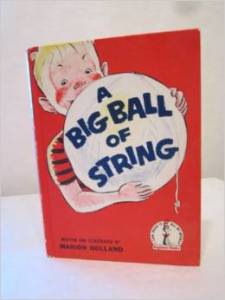 One of Lain’s favorite books is A Big Ball of String. It was written in 1958 and incorporated into Dr Seuss’s “Beginners Series.” The plot involves a young boy who wants to gather a big ball of string, and having gathered it, has an adventure trying to figure out how to do. It’s snappy in the Seussian manner, and I really like it because it prizes childhood imagination and ingenuity.
One of Lain’s favorite books is A Big Ball of String. It was written in 1958 and incorporated into Dr Seuss’s “Beginners Series.” The plot involves a young boy who wants to gather a big ball of string, and having gathered it, has an adventure trying to figure out how to do. It’s snappy in the Seussian manner, and I really like it because it prizes childhood imagination and ingenuity.
The book looks like it is long out of print. As you can see if you followed the previous link, it sells from $23 for a heavily used copy, to over $650 for a “new” copy (by which I assume they mean in its original packaging.
Why is this book no longer available? Well, there are two potential reasons. The first is that it simply didn’t sell very well. The second is that one of the subplots involves a toy gun, which may not be kosher with some parents and may garner bad publicity (which starts sounding just a bit like corporate censorship).
On the first count, that used to hold more sway than it currently does. This day in age, between ebooks and print-on-demand, low sales shouldn’t be the barrier that it once was. It’s also noteworthy that this was a book written fifty years ago. The fact that it’s still held in copyright, by a publisher that (assuming it’s not the toy gun) that has no interest in it, represents something aggravating about copyright law. Even if we grant a right to near-perpetuity when it comes to profiting off creative works, in cases like this they seem to actually have no interest in it. But since it’s still under copyright, nobody else can, either.
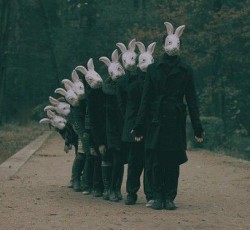 Domestic violence rates among NFL players is astoundingly high. Even so, overall arrest rates of athletes remain remarkably low.
Domestic violence rates among NFL players is astoundingly high. Even so, overall arrest rates of athletes remain remarkably low.
Eric Siu makes the case that employee happiness matters.
God’s Not Dead was filed for two million dollars and has thus far pulled in over sixty. It’s almost as though there is a market for such movies. Surely, with Hollywood being the capitalist beast that it is, scores of them are on the way. Right?
Unsurprisingly, it’s a better idea to give students work machines instead of toys.
According to John Henry Thompson and Andrew Quinn, providing housing to poor families doesn’t actually change outcomes much. They argue this has implications for the “just give them money” debate.
Allison P Davis is frustrated at her inability to mooch a charge for her phone. I would just point out that with a Samsung and a spare battery, this isn’t an issue.
Adam Ozimek looks at the sharing economy being most beneficial for developing countries.
The Japanese may or may not want to fire the nuclear plants back up, but according to Satsumasendai it really needs to happen.
A federal bill wants to restrict gun advertising “to children” on the same basis that cigarette advertising to children is banned. Eugene Volokh explains that there are differences.
Ruben Santamarta says passenger jets vulnerable to cyberattack.
Before physicians make a lot of money, they make less than a lot of money.
Jonathan McLeod is tired of Canadian cities trying to be cool for Europeans. The shorthand back home was “World Class”, as in “We have to pursue my favored policy because we want to be world class” as in “If we don’t do this, people who don’t live here will laugh at us.” (“This” usually being some variation of greenbelts, rail, and/or “smart growth”.)
Gabriel Rossman makes a good point about some of the recent botched executions, arguing that they are predicated in part on the actions of death penalty opponents and blame-assignment is unclear.
Even if no other measures are taken, transparent health care pricing may pay a crucial role in lowering health care costs.
Michael Brendan Dougherty argues that the victory of the culture wars could be… Apple, Google, and Facebook.
I have a tendency to be ignorant on basic rules of etiquette. There are some things, though, that strike me as so obvious that even I understand them.
Let’s say that someone who moved away a long while back is coming in town. You’re talking about having dinner together. Where do you eat?
To me, the correct answer is “Within reason, anywhere they want to eat.” Especially if there is a strong preference involved.
Whenever I return to Dixie, I almost always have a hit list of places I want to eat. I don’t necessarily expect to hit all of them, mind you, but I like to fill as many open meals with these places as possible.
 I used to run into this with my father a lot. One of the hardest things about leaving my pocket of the South, at least in terms of food, was actually a regional fast food joint, which I will call Happy Burger. Their breakfasts are especially good. More than that, I have so many fond memories of the place from when I was growing up. Yet over and over again, when I would come home and Dad and I would do our breakfast, he would agitate going to Denny’s.
I used to run into this with my father a lot. One of the hardest things about leaving my pocket of the South, at least in terms of food, was actually a regional fast food joint, which I will call Happy Burger. Their breakfasts are especially good. More than that, I have so many fond memories of the place from when I was growing up. Yet over and over again, when I would come home and Dad and I would do our breakfast, he would agitate going to Denny’s.
Back in the day, we almost never went to Denny’s. Happy Burger was cheaper. But he figured that since my being at home was a special treat, we should go eat at Denny’s because it’s nicer. It actually took a long time to be able to articulate why I wanted to go to Happy Burger.
I visited a friend in the southwest, who just absolutely insisted that I needed to go try out this pho place. Except having lived there for a while, I already knew exactly where I wanted to eat. My list of places to eat was already long, and I was more anxious to return to food that I knew that I loved and couldn’t get than to – best case scenario – find some new outstanding place I wouldn’t be able to eat at again except in competition with every other restaurant in the city I love during rare return visits. We ate pho. It was okay. I don’t really like pho.
It happened again this last trip. Where the decision was between McDonald’s or Happy Burger. My attempts to explain that we can eat at McDonald’s any time and I wouldn’t have a chance at eating at Happy Burger for another four months was outvoted because McDonald’s has a special deal on free coffee and was six minutes out of our way.
Once I resigned myself to the fact that I’d lost, I let my mother-in-law know that we could save about four minutes by going on a slightly different route. This information went ignored, because the longer route would get us there just as surely as the new route would.

